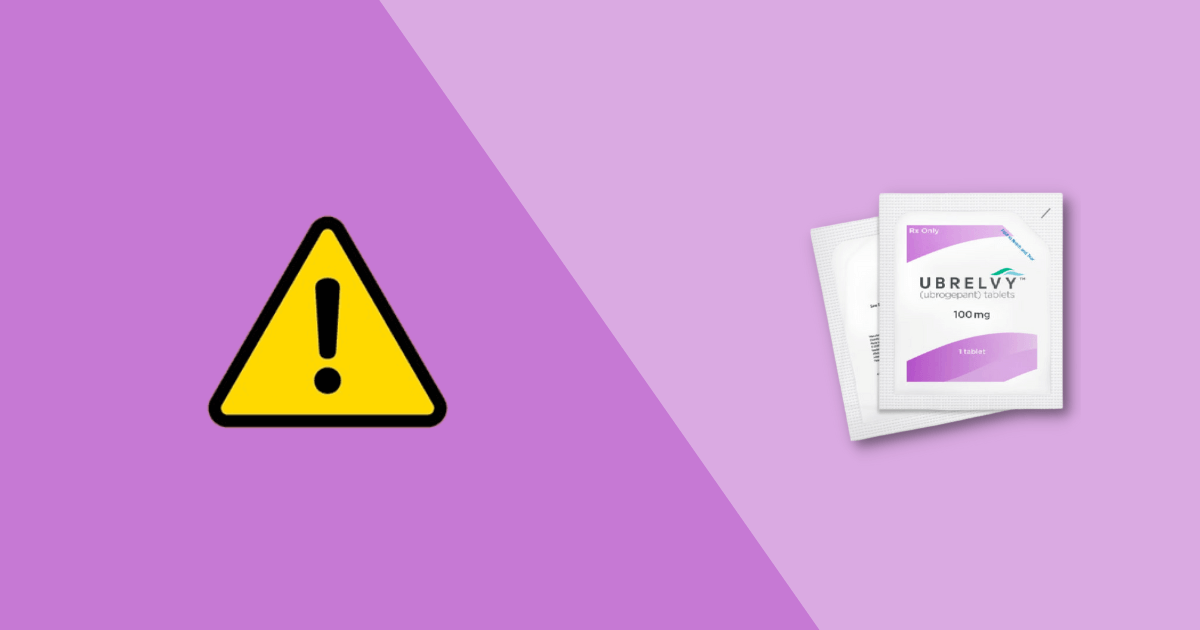Ubrelvy side effects and how to avoid them
Table of contents
Ubrelvy is a brand-name medication manufactured by Allergan. It is classed as a calcitonin gene-related peptide (CGRP) receptor antagonist and is used for the fast-acting relief of migraine symptoms in adults. While Ubrelvy is generally well tolerated, there are some potential side effects that people should be aware of. The most common side effects of Ubrelvy include drowsiness. Less common, but more serious side effects, can include allergic reactions.
Learn more about the side effects of Ubrelvy and what you can do to avoid them.
What is Ubrelvy (ubrogepant)?
Ubrelvy is an FDA (U.S. Food and Drug Administration) approved medication. It contains ubrogepant as the active ingredient. Ubrelvy is not a triptan, it belongs to a class of drugs called CGRP receptor antagonists. Ubrelvy works by preventing CGRP from attaching to CGRP receptors on nerve endings. It is indicated for the acute treatment of migraine headaches with or without aura in adults. It is not recommended for the preventive treatment of migraine attacks.
Ubrelvy dosage
Ubrelvy is available in tablet form, in the following doses: 50 mg and 100 mg. The recommended dose is 50 mg or 100 mg orally, as needed. If needed, a second dose may be administered at least 2 hours after the initial dose. The maximum dose in a 24-hour period is 200 mg. For severe hepatic or renal impairment, the recommended dose is reduced to 50 mg if needed. A second 50 mg dose may be taken at least 2 hours after the initial dose.
Please read the full patient information and drug information, and always speak with a healthcare professional for medical advice about any changes to your dose so they can monitor and evaluate your condition.
Ubrelvy side effects
The most common side effects of Ubrelvy in clinical trials compared to placebo include:
- Nausea
- Tiredness
- Dry mouth
- Drowsiness, sleepiness
In rare instances, Ubrelvy can cause more serious side effects. These can include:
- Allergic reactions – hives, difficulty breathing, swelling of your face, lips, tongue, or throat
If you experience any of these serious side effects, stop taking Ubrelvy and seek medical attention immediately. You are encouraged to report negative side effects of prescription drugs to the FDA. Visit www.fda.gov/medwatch, or call 1-800-FDA-1088.
Ubrelvy drug interactions
Ubrelvy can interact with other medications including:
- Strong CYP3A4 inhibitors – ketoconazole, clarithromycin, itraconazole
- Moderate CYP3A4 inhibitors – cyclosporine, ciprofloxacin, fluconazole, fluvoxamine, grapefruit juice
- Strong CYP3A4 inducers – phenytoin, barbiturates, rifampin, St. John’s Wort
- Heart or blood pressure medicine – carvedilol, quinidine, verapamil
This list is not exhaustive and other prescription drugs may interact with Ubrelvy. Tell your healthcare provider about all the medicines you take, including prescription and over-the-counter medicines, vitamins, and herbal supplements.
Ubrelvy warnings & precautions
You should not use Ubrelvy if you:
- Are allergic to the active ingredient ubrogepant
- Have had an allergic reaction to any of the other ingredients in Ubrelvy
- Have end-stage renal disease
Talk to your doctor about your medical conditions before using Ubrelvy if you:
- Are taking any of the medications that could interact with Ubrelvy
- Have liver problems
- Have kidney disease
- Are pregnant or are planning to become pregnant
- Are breastfeeding or are planning to breastfeed
You should always check with your doctor or pharmacist before taking any medication, including Ubrelvy, to make sure it is safe for you.
How to avoid Ubrelvy side effects
The best way to avoid side effects is to take Ubrelvy as directed by your doctor. Follow your doctor’s instructions carefully and do not take more or less than prescribed.
If you experience any side effects, talk to your doctor or pharmacist. They may be able to recommend ways to help reduce or prevent some of the side effects.
1. Stick to the recommended dosage
Take your prescribed dose of Ubrelvy that has been recommended by your healthcare professional. Do not take more or less than prescribed.
2. Drink plenty of fluids
Ubrelvy is not associated with causing dehydration. Dehydration however can trigger migraine attacks. Make sure you drink plenty of water to prevent this.
3. Avoid alcohol
Alcohol does not interact with Ubrelvy, but alcohol and Ubrelvy can both cause nausea and sleepiness, and taking both could increase your risk of these side effects.
4. Know the signs and symptoms of Ubrelvy side effects
Signs and symptoms of side effects include nausea, tiredness, and drowsiness. If you experience any of these symptoms speak to your doctor for medical advice.
5. Monitor your weight
Weight gain or weight loss have not been reported as side effects of Ubrelvy.
6. Tell your doctor about all medications you’re taking
Be sure to tell your doctor about all other medications you’re taking, including over-the-counter drugs, vitamins, and herbal supplements, as they can interact with Ubrelvy.
7. Get regular medical check ups
It is important to get regular medical check ups and monitor your medical conditions. Your doctor will monitor your side effects and may adjust your dose of Ubrelvy as needed.
Medically reviewed
A medical professional has reviewed this article.


Jamie Winn, PharmD
Jamie Winn, PharmD
Dr. Jamie Winn received his Doctor of Pharmacy in 2002 from the University of South Carolina College of Pharmacy, Columbia, SC. Jamie is a medical reviewer for NiceRx.


